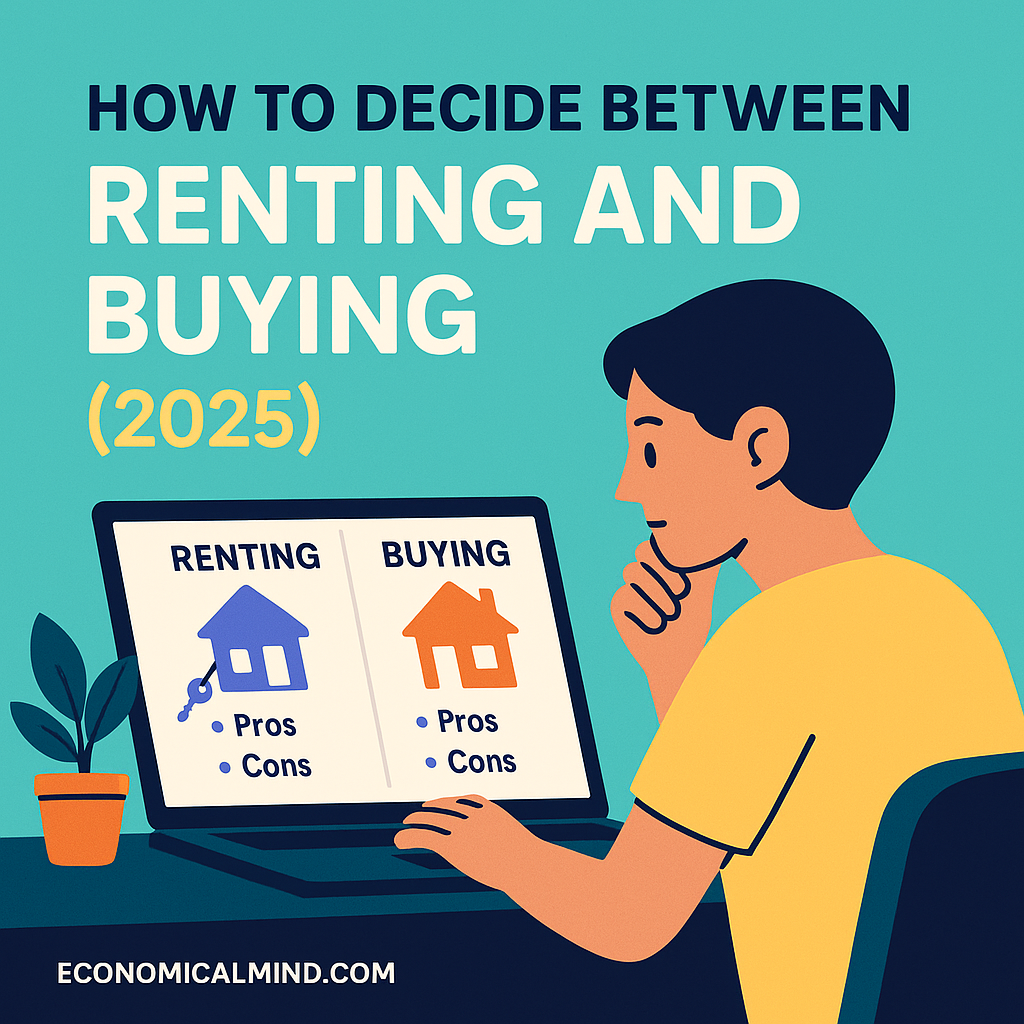
The Big Question: Rent or Buy in 2025?
With housing prices still high and mortgage rates fluctuating, deciding whether to rent or buy in 2025 isn’t as straightforward as it used to be.
Buying a home can be a great investment — but it’s not always the smartest move, especially if your lifestyle or finances aren’t ready for long-term commitment. Renting, meanwhile, offers flexibility and lower upfront costs but doesn’t build equity.
The key is understanding your financial situation, your goals, and the market where you live.
Step 1: Assess Your Financial Readiness
Before anything else, look honestly at your finances. Ask yourself:
- Do I have a stable income and job security?
- Can I afford a down payment (typically 3–20%)?
- Do I have at least 3–6 months of emergency savings?
- How’s my credit score (ideally 700+ for better mortgage rates)?
Buying a home involves major upfront costs — including the down payment, closing costs, property taxes, and insurance. Renting, on the other hand, usually requires only a security deposit and first month’s rent.
Rule of thumb:
If you plan to stay in the same place for less than 5 years, renting often makes more financial sense. If you’ll stay 7+ years, buying may offer better long-term value.
Step 2: Understand the Hidden Costs
It’s easy to compare monthly rent to a mortgage payment, but that’s not the full picture.
Homeownership includes:
- Property taxes
- Homeowner’s insurance
- Maintenance and repairs
- HOA fees (if applicable)
- Utilities (often higher than in rentals)
Renting, by contrast, usually means fewer surprise expenses — your landlord handles most maintenance, and your monthly costs are predictable.
Example:
A $2,000 monthly rent may seem equal to a $2,000 mortgage, but once you add taxes, insurance, and maintenance, the real cost of owning could be closer to $2,500–$2,800 per month.
Step 3: Consider Market Conditions in 2025
In 2025, housing markets across the U.S. vary widely. Some cities are still recovering from 2022–2023 price surges, while others are stabilizing.
Buying might make sense if:
- Prices in your area are stable or rising
- Mortgage rates are favorable (below 6%)
- You find a property undervalued or below market rate
Renting might make sense if:
- Local home prices are overinflated
- You expect to move within a few years
- Interest rates are high or credit scores need improvement
Use online tools like Zillow’s Rent vs Buy Calculator to compare total costs over time based on your city, income, and goals.
Step 4: Weigh the Pros and Cons of Renting
Advantages of Renting:
- Flexibility to move anytime
- No maintenance costs
- Easier budgeting with fixed payments
- Lower upfront financial commitment
Disadvantages of Renting:
- No equity or investment growth
- Rent can increase annually
- Limited control over property changes
- No tax benefits
Renting is ideal for people who value mobility, lower risk, and fewer financial responsibilities.
Step 5: Weigh the Pros and Cons of Buying
Advantages of Buying:
- Builds equity over time
- Predictable payments (with fixed-rate mortgage)
- Potential tax deductions (mortgage interest, property taxes)
- Freedom to customize your home
Disadvantages of Buying:
- Higher upfront costs and maintenance
- Market risk (home value can drop)
- Less flexibility to move
- Ongoing responsibilities and repairs
Buying is ideal for those ready to settle down and build long-term wealth.
Step 6: Consider Lifestyle Factors
Money isn’t the only factor — your lifestyle matters, too.
Buying may fit if you:
- Want to settle in one location for several years
- Desire stability or raising a family
- Enjoy customizing your space and building long-term equity
Renting may fit if you:
- Plan to change jobs or cities soon
- Prefer low maintenance and flexibility
- Are still improving your credit or saving for a down payment
In short: buy for stability, rent for freedom.
Step 7: Crunch the Numbers — The 5-Year Rule
A simple way to decide:
If you’ll stay in a home for at least five years, buying often becomes financially beneficial after accounting for appreciation, equity, and tax savings.
But if you’ll move within three years or less, renting almost always wins due to lower upfront costs and less risk.
Use the price-to-rent ratio to gauge your area’s market:
- Ratio under 15: Buying likely better
- Ratio 16–20: Neutral — depends on lifestyle
- Ratio above 21: Renting likely better
You can find this ratio by dividing a home’s price by its annual rent.
Step 8: Factor in Inflation and Interest Rates
In 2025, inflation has cooled compared to previous years, but housing costs remain elevated.
If mortgage rates drop below 6%, buying becomes more attractive for many first-time buyers. But if rates hover above 7%, renting may provide short-term relief while you save for a stronger down payment.
Keep an eye on Fed policy and market trends — even a 1% difference in rates can change affordability by hundreds per month.
Step 9: Think About Long-Term Wealth
Renting keeps your cash flexible, but buying builds equity — the portion of your home you truly own. Over time, this equity can be tapped through refinancing, selling, or home equity loans.
However, remember: homeownership is not a guaranteed investment. Market downturns can temporarily reduce your home’s value. The true financial advantage of buying comes from staying in the property long enough to offset initial costs.
Final Thoughts
Deciding whether to rent or buy in 2025 comes down to balance — between financial readiness and lifestyle flexibility.
If you value mobility, simplicity, and fewer expenses, renting can make perfect sense.
If you’re financially stable, plan to stay put, and want to build long-term wealth, buying can be a powerful move toward financial independence.
The best choice is the one that aligns with your goals, your budget, and your future vision — not just market trends.
